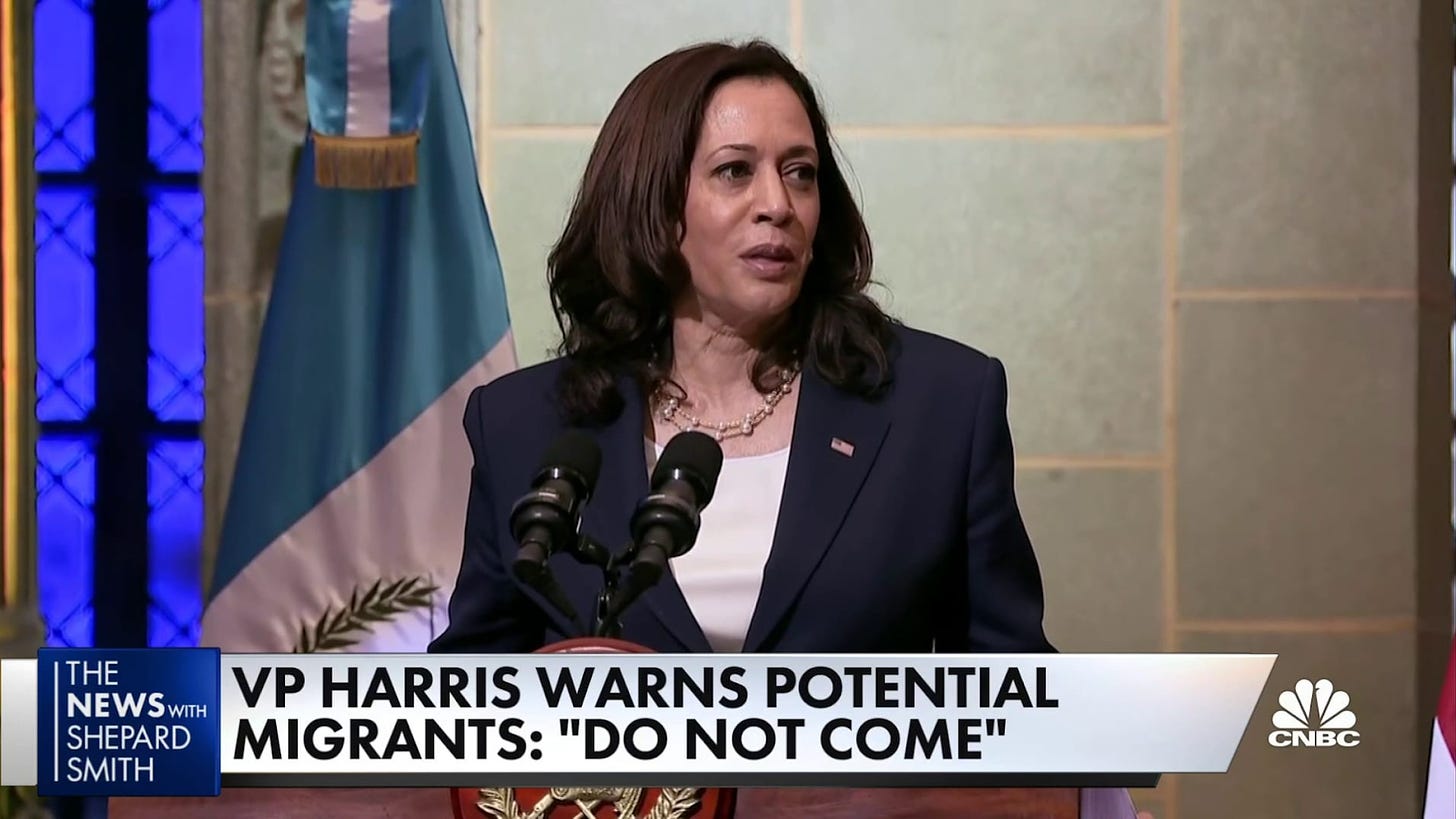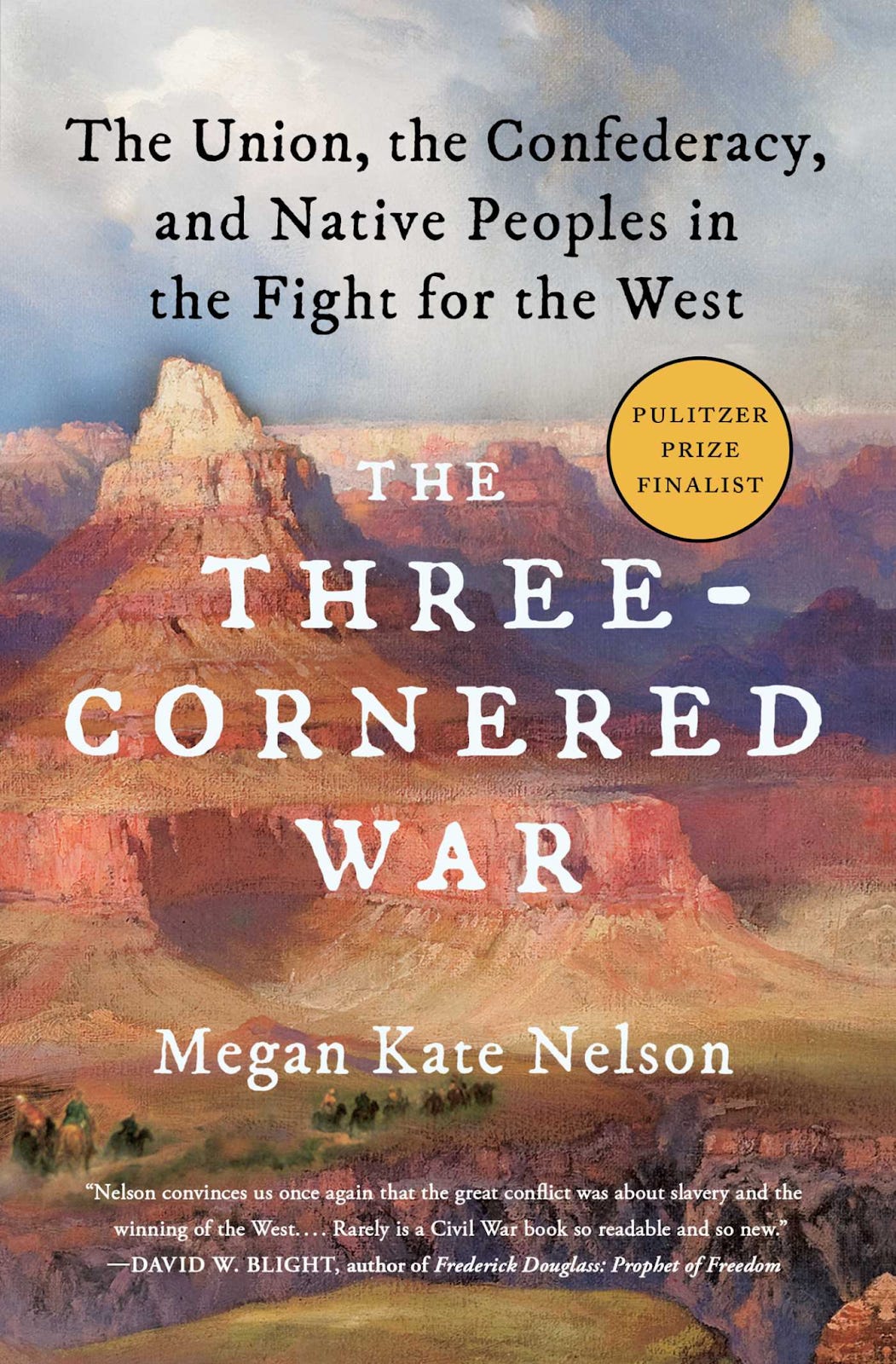(this post was written in collaboration with research intern Alice Wanamaker)
“There’s been no new voice on this issue more electrifying than hers,” Ben Wikler, director of MoveOn.Org, said in 2017 of then-freshman-senator Kamala Harris’s record on DACA.
Harris had just announced she would refuse to back a federal spending bill until Congress took action to protect DACA recipients — beneficiaries of the Deferred Action for Childhood Arrivals program — from President Trump’s threats to terminate the program. She was the first senator to stake that position.
At that point, Harris was building relationships with immigration advocates, calling on politicians to “stop playing politics with these kids1,” and joining pro-immigrant rallies. She was, by all accounts, committed to championing migrant rights as she launched her career in federal politics.
But Harris’s stance on DACA wasn’t particularly risky, especially in California. A poll at the time found that 48% of Americans and 73% of Democrats supported DACA. I’m not doubting the authenticity of Harris’s support for the program, but, given the subsequent seven years, it does seem representative of her relationship to migrant rights.
From the beginning of her career up to her current sloganeering as a standard-bearing and politically breeze-blown presidential candidate, Harris has, when it comes to the border and migration, emphatically championed the politically palatable. Her commitment to the issues has never gone against the grain of partisan public sentiment or the overall inertia of the U.S. immigration system.
She is, in short, a member of the Democratic Party.
Capital D Democrats now openly espouse increased “border security,” more surveillance technology, raising the threshold for asylum, deporting more asylum seekers, increasing immigration detention, and funding Latin American governments to unleash law enforcement officers on northbound migrants. Think of it as the Texasfication of the Democrats’ migration platform. (More on Texas in an upcoming post.)
Waffling Up – Harris’s Early Immigration History
In 2005, as the district attorney of San Francisco, Harris launched the Back on Track program, offering job training as an alternative to prison for some people facing nonviolent drug charges. Participants in the program had a significantly lower rate of recidivism than those given prison sentences —10% versus 53%. Some of the participants were immigrants without legal status.
The inclusion of undocumented immigrants generated significant public backlash when, in 2008, one participant committed a violent crime. Harris’s office decided to ban undocumented immigrants from the program. Saying that her administration’s previous inclusion of people without documents had been a “flaw in the design,” Harris said that people who couldn’t legally work in the U.S. should never have been allowed to participate.
In the same year, 2008, Harris supported then-mayor Gavin Newsom’s policy of reporting undocumented children and teens to ICE if they were arrested. San Francisco had been a sanctuary city since 1989, but Newsom created the more stringent rule after a similar incident of crime-and-xenophobic-rebound to the one that sank undocumented participation in Back on Track. San Francisco’s board of supervisors protested, passing an ordinance that information could only be shared with ICE if youthful offenders were convicted of felonies, but Newsom and Harris continued to enforce their policy anyway.
In a 2009 speech at Stanford, Harris defended her refusal to comply with the board of supervisors, saying that she believed their law might have been unconstitutional. (There are, notably, strong legal defenses for the policy of non-cooperation San Francisco held in the first place.) A campaign spokesperson for her first presidential bid said in 2019 that the policy “could have been applied more fairly,” as stories of children being deported for minor offenses began to surface.
When she became attorney general of California, Harris’s immigration policy focus was on supporting and expanding existing procedural protections for migrants. She pushed legislation to expand the granting of U-visas in California and defended the constitutionality of the Deferred Action for Parents of Americans (DAPA) program. And as both AG and senator, she advocated for DACA recipients as the Trump campaign demonized and deported them. All these actions affirmed the humanity of immigrants. None of them countered the national consensus that some immigrants deserve to be humanized and others can be swept away — jailed and then banished.
“Do Not Come”
As Vice President, Harris became a lightning rod for immigration issues, despite having less to do with the immediate conditions of migrants in the U.S. than she had in her previous positions. Harris was never put in charge of the Biden administration’s border policy. Rather, her assignment was to spark U.S. business investment in Central America, which it appears she did, but which it is way too early to properly assess, and which — “development aid” — has a long history of causing more harm than good.
Harris was also positioned to take some heat off of Biden on the border security issue, which she definitely has since, but she was never appointed as a “border czar” – a position that doesn’t exist. In her loosely-defined role on Central America, Harris notoriously told Guatemalans thinking of crossing into the U.S. “Do not come. Do not come.”
Overall, Kamala Harris has proven herself to be, in regards to immigration , not Trump. But beyond that, she’s also proven she’ll pivot any time her support for immigrants seemed to outpace public consensus, and has been an advocate only for issues that are broadly accepted amongst the non-Trumpist public. She has gone only as far as centrist Dems — and probably RINOs — will follow.
(If you can stomach it, read more analysis of Harris on immigration in the New Yorker, CNN, CBS, the LA Times, NPR, Newsweek, the Center for American Progress, the Guardian, and Forbes.)
Or want to read what a possible Trump second term would herald?
Or hear me discuss some and more of this on the American Prestige podcast?
What I’m Reading:
I recently read The Three-Cornered War, by Megan Kate Nelson. It’s a narrative retelling of some of the major battles and politics of the U.S. Civil War as it played out in the Southwest — not the part of the country usually recalled of when thinking of that brutal fight over slavery. While there were a few battles and skirmishes in western Texas, New Mexico, and Arizona between the Union and Confederate armies, most of the violence was directed at Indigenous groups, particularly the Diné or Navajo. Both U.S. sides recognized the importance of that land for access to Mexico and mineral deposits, as well as transit lands towards California ports. And so, even while fighting each other, both sides engaged in “ruination” campaigns, what the Diné call Nahondzod, or “fearing time.”
As Nelson puts it: “The Republicans clearly did not see Indian slavery as the same sort of immoral system as African-American enslavement. They took the same stance they had since 1863, fighting simultaneously for black emancipation and indigenous incarceration.”
And, slowly, wondrously, along with a group of friends, Thomas Mann’s bizarre and beautiful masterpiece The Magic Mountain.
many DACA recipients are older than 18.






Let's continue to push Harris Walz back to a pro-migrant position.
Sometimes I try not to think too critically of the policy flip-flops. I’m used to them by now and recognize they are par for the course. But, the low bar when it comes to Trump, make capital D Democrats think they appear moderate or even progressive simply by not aligning with him, lowering the threshold for what is considered politically bold or visionary. I recognize the drift towards center-right policies is a strategy to appeal to a broader electorate, but Dems are now unapologetically alienating a progressive base that demands more substantial action on immigration, economic inequality, and climate change. And when called out on it are told, “vote for Trump then”. Huh? We are essentially reacting to the polarization caused by Trumpism, framing policies as "not Trump" rather than defining a clear progressive agenda.
It’s troubling. And I hope it reverses. Enjoyed the read good sir. Thanks for writing.